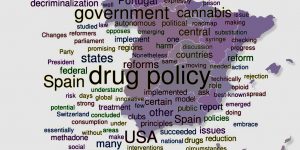Better to Ask Forgiveness Than Permission: What the rest of the world can learn from Spain’s approaches to drug policy
The movement for drug policy reform is a global one – and it has become increasingly important to look at what other countries are doing on drug policy to see what can be learned. Portugal’s decriminalization model and Switzerland’s pioneering role in heroin-assisted treatment have been studied extensively, and there’s an emerging field of promising research evaluating state-level cannabis legalization in the U.S.
Overlooked in this discussion is Spain, where certain sub-national entities (similar to states in the U.S.) have implemented innovative approaches to drug policy based on the principles of harm reduction and a rejection of prohibitionist principles.
A new report, released today, takes a deep dive into Spain’s drug policy reform. What makes these reforms interesting is that they’ve succeeded in spite of the central government, not because of it – an approach that we call “better to ask forgiveness than ask permission”.
The best-known of Spain’s drug policy innovations are cannabis social clubs, which emerged in Catalonia and the Basque Country and have now spread throughout the country. These clubs utilize ambiguities in the law to allow the use and distribution of cannabis to their members under certain circumstances.
And Spain isn’t just noteworthy for its cannabis policies. The U.S. and other countries can learn a lot from Spain’s successful harm reduction interventions, which include safe consumption spaces, heroin-assisted treatment, take-home methadone, opioid substitution and syringe programs in prison, mobile methadone clinics, and drug checking services to prevent accidental overdoses.
 At the same time, Spain has never technically criminalized drug possession, meaning that drugs are essentially decriminalized. Nonetheless, there are many fines and fees for possessing drugs, making Spain’s policy more punitive than Portugal’s.
At the same time, Spain has never technically criminalized drug possession, meaning that drugs are essentially decriminalized. Nonetheless, there are many fines and fees for possessing drugs, making Spain’s policy more punitive than Portugal’s.
While Portugal’s model is often seen as a beacon for reformers, political realities make its implementation in places like the U.S. very challenging. Portugal’s national drug decriminalization policy was comprehensively implemented in 2001 by its central government. It’s unlikely that the U.S. federal government – especially the current one – would implement drug decriminalization nationally without states moving forward on the issue first.
Spain’s political system – autonomous regions and a central government – largely mirrors that of the U.S, with states having a level of autonomy on many issues despite there being a strong role for the federal government. As we have seen with cannabis reform in the U.S., states will take action on certain drug policy issues even when the federal government expressly opposes it. Spain provides a potential roadmap for how U.S. states can implement cutting-edge drug policies in other areas, beyond cannabis.
Since many of Spain’s reforms are undertaken by autonomous regions, there is still a risk that the central government could try to undo their progress. This report was concluded a few days before Spain’s President Rajoy was dismissed by parliament and the new socialist government of Pedro Sanchez came to power. Changes in public policy are expected on many fronts, including drug policy and other public health issues.
However, until now, the Socialist Party has yet to embrace drug policy reforms.
This report serves as a guide for countries around the world, as well as the new Spanish government, to understand how and why Spain’s drug policy reforms have succeeded so far – and where improvement is needed in the coming years.
You can read the full report here: Full Report
Constanza Sánchez is a GDPO Research Associate and the Law, Policy and Human Rights Director at ICEERS
Michael Collins is the Deputy Director at Drug Policy Alliance’s Office of National Affairs. He just spent 9 months in Catalonia, working on drug policy.
**The Spanish version of this policy briefing will be available soon / La version en español de este informe estará disponible muy pronto.